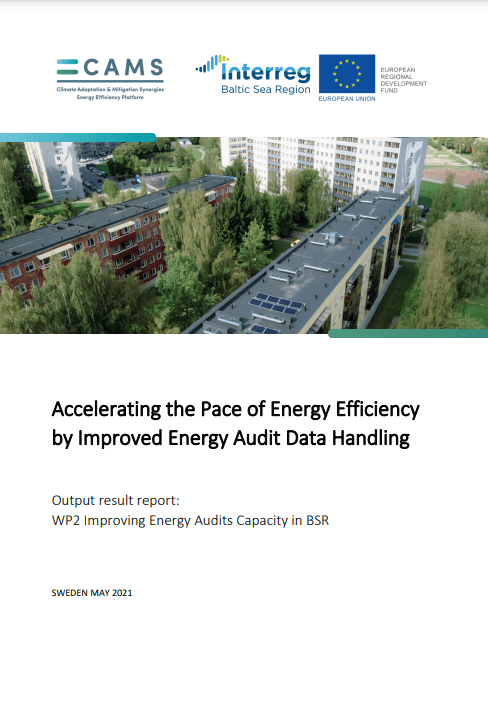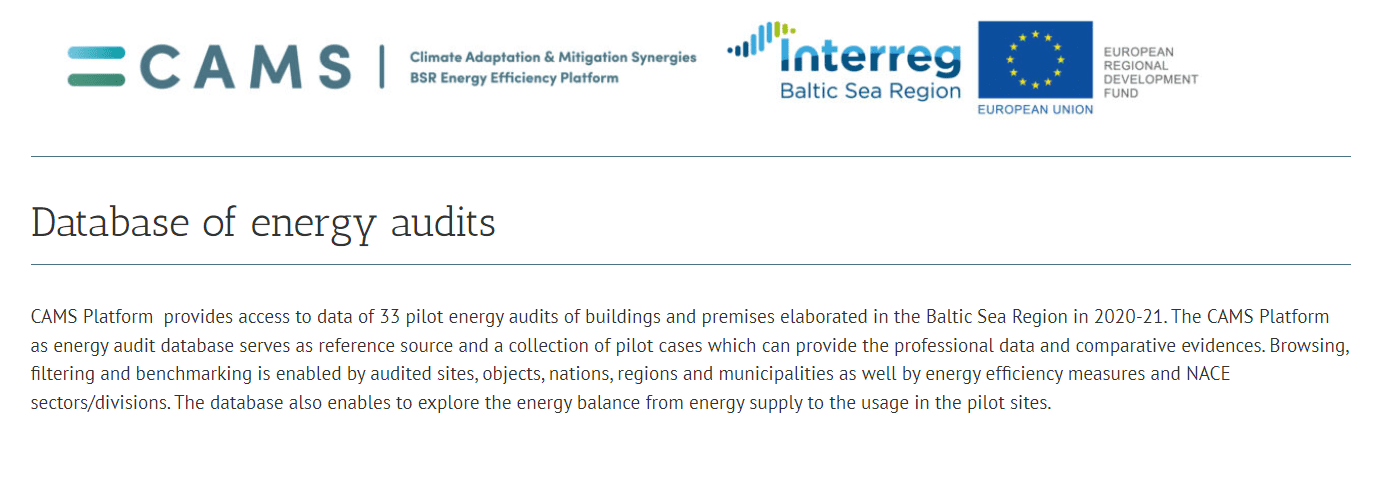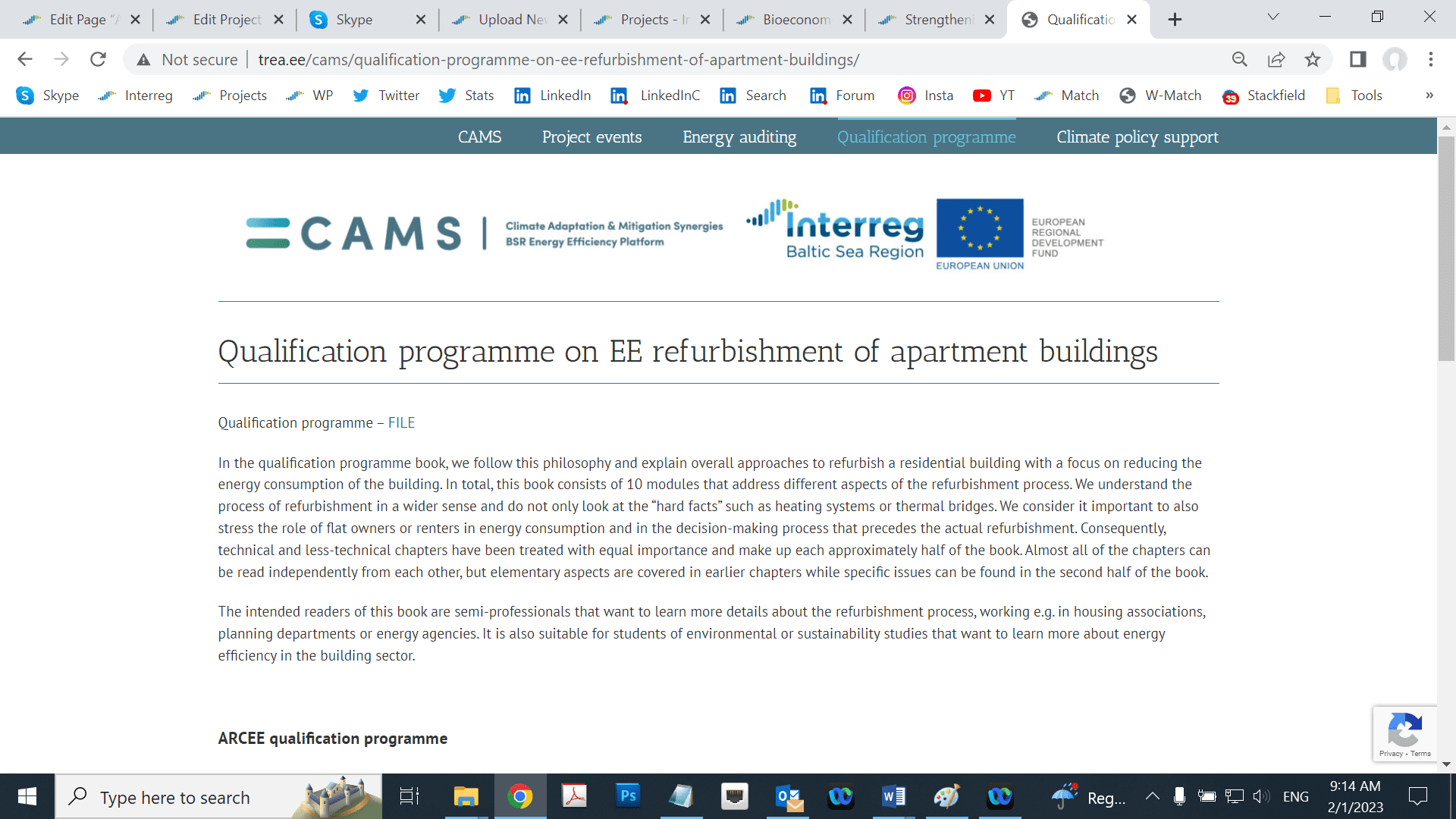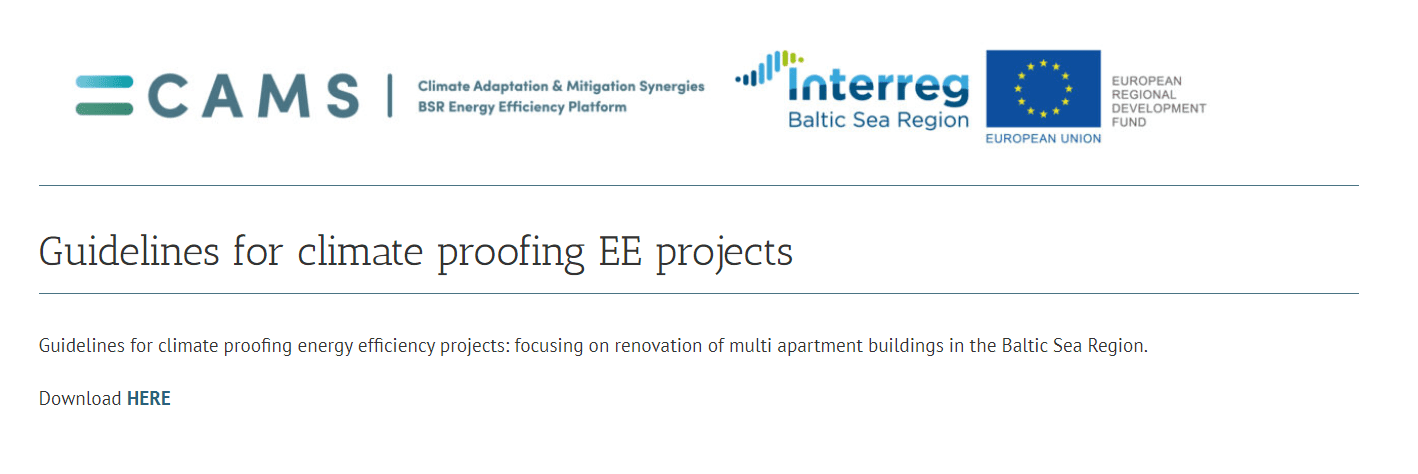CAMS Platform
The negative impacts of climate change upon human and natural ecosystems can be minimised by substantial reductions in greenhouse gas emissions. High energy consuming housing and production sectors still leave a major carbon footprint. The CAMS Platform improved energy efficiency measures by aligning research, recommendations, audits and investments from 11 projects across the Baltic Sea region.
Projects represented in the platform:
- Interreg Baltic Sea Region: LowTemp | AREA 21 | Co2mmunity | EFFECT4Building | BEA-APP | RDI2Club
- Horizon 2020: SIM4NEXUS | HERON | ENLARGE
- EuropeAid: ARCEE
Budgets
in numbers
-
1.05MillionTotal
-
0.75MillionErdf
-
0.10MillionEni + Russia
-
0.00MillionNorway
Achievements
Towards harmonised climate and energy policies
The CAMS platform helped national ministries, regional and local public authorities plan and implement climate and energy policies in a more efficient way. It synthesised the findings of ten Interreg, Horizon2020 and EuropeAid projects.
Firstly, the platform provided municipalities, energy agencies and energy auditors with higher-quality, quicker, more holistic, and comprehensive energy auditing methodology that is harmonised across the Baltic Sea region. More than 400 energy professionals joined the national energy auditing days in Estonia, Latvia, Sweden, Poland and Russia to learn about energy efficiency, auditing and certification of the building energy performance. To test the auditing methodology, the partners elaborated 33 energy audits in five countries, 12 regions and 19 municipalities, distributed among four building types or NACE divisions (real estate, education, culture, social care). Out of these, 31 objects consumed 9 GWh/year, and their energy saving potential with chosen measures was 2,8 GWh, which corresponded to 30% of the total energy end-use for those audits. The greatest contributor to energy saving was the space heating measure and ventilation. The platform made these energy audits available to energy auditors around the Baltic Sea region. For example, the measures section provided the cross-region and cross-sectoral comparison and the range of cost efficiency.
New tools for energy efficient refurbishment
Secondly, the partners worked on strengthening the qualification programme for energy efficient refurbishment of multi-apartment buildings and integrating energy efficiency and climate change adaptation. The programme was introduced to higher education institutions in Estonia, Latvia, Sweden, Poland, Germany and Finland. The partners also used it for training local authorities on housing and urban regeneration.
Setting grounds for policies on energy efficiency and climate neutrality
Finally, the platform helped advance policy processes related to energy efficiency and climate neutrality. The partners developed policy recommendations on how to mainstream climate into new European Structural and Investment Funds programmes 2021-2027. The national EU funding programmes became more focused on accelerating the transition towards climate neutrality, for example, by improving energy efficiency via the reconstruction of buildings and district heating systems. These policy recommendations also contributed to the revision of the EU Climate Adaptation Strategy, adopted in 2021. The platform has helped include more active mainstreaming of climate resilience considerations in all relevant policy fields applicable to both the public and the private sectors.
The EUSBSR policy area Energy was actively engaged in the platform work, foremost on advancing the policy towards the unified data handling of energy performance audits and merging climate adaptation into energy efficiency projects.
Outputs
Report: Accelerating the Pace of Energy Efficiency by Improved Energy Audit Data Handling

Database of energy audits

Qualification programme on energy efficient refurbishment of apartment buildings in the BSR

Policy recommendations for mainstreaming climate into ESIF 2021-2027

http://trea.ee/cams/policy-recommendations-for-mainstreaming-climate-into-esif-2021-27/

Project Stories
-
29.03.2021
Cooperation as the key to a climate-neutral Baltic Sea region
A common challenge for the countries in the Baltic Sea region is how to produce green and climate-neutral energy. In fact, as much as 75% of the EU greenhouse gas emissions still come from energy use and production. Cooperation and sharing good practices in Interreg projects, such as LowTEMP, Baltic Integrid and Area 21, can be a game-changer in accelerating the energy transition in the region.Read full story -
04.12.2019
What Russian partners do in Interreg projects: 5 examples from the Baltic Sea region
As many as 43 Interreg Baltic Sea Region projects are working together with Russian partners, showcasing that the same cause unites people beyond borders. From innovating businesses to saving energy and improving mobility – Russian partners are active in all thematic fields of the Programme. But what do they actually do?Read full story -
11.06.2018
Rethinking energy in the Baltic Sea region
Establishing more sustainable and competitive energy systems that have a less harmful impact on the environment are among the core challenges for the Baltic Sea region. Two Interreg projects, AREA 21 and LowTEMP, unlock energy efficiency potential by triggering public and private strategic partnerships for energy production and management and by offering low temperature district heating technology for more efficient heating systems.Read full story -
20.12.2016
Conflict resolution in spatial planning enables wind farm development in europe
On 8 May Germany hit a record high number of 87,6 % of national electricity generated from renewable resources. Even though Germany and other countries around the Baltic Sea are doing well in renewable energy production, there is still a lot left to do in terms of installing renewable energy facilities In order to meet the EU energy goals by 2030.Read full story
Partners
Tartu Regional Energy Agency
- TownTartu
- RegionLõuna-Eesti
- CountryEstonia
- RepresentativeMartin Kikas
- Phone
- E-Mail
- Web
County Administrative Board of Dalarna
- TownFalun
- RegionDalarnas län
- CountrySweden
- RepresentativeMarit Ragnarson
- Phone
- E-Mail
- Web
Permanent International Secretariat of the Council of the Baltic Sea States
- TownStockholm
- RegionStockholms län
- CountrySweden
- RepresentativeValdur Lahtvee
- Phone
- E-Mail
- Web
Ministry of Economics
- TownRiga
- RegionRīga
- CountryLatvia
- RepresentativeMadara Zvirgdzina
- Phone
- E-Mail
- Web
Foundation of Energy Saving in Gdansk
- TownGdansk
- RegionTrójmiejski
- CountryPoland
- RepresentativeJacek Lendzion
- Phone
- E-Mail
- Web
Baltic Environmental Forum Latvia
- TownRiga
- RegionRīga
- CountryLatvia
- RepresentativeLiga Pakalna
- Phone
- E-Mail
- Web
Baltic Environmental Forum Germany
- TownHamburg
- RegionHamburg
- CountryGermany
- RepresentativeMatthias Grätz
- Phone
- E-Mail
- Web
Stockholm Environment Institute Tallinn Centre
- TownTallinn
- RegionPõhja-Eesti
- CountryEstonia
- RepresentativeKaja Peterson
- Phone
- E-Mail
- Web
Peter the Great St.Petersburg Polytechnic University
- TownSt. Petersburg
- RegionCity of St. Petersburg
- Country
- RepresentativeYury Nurulin
- Phone
- E-Mail
- Web
-
Project managerAntti RooseTartu Regional Energy Agency
-
Legal representativeMartin KikasTartu Regional Energy Agency
-
Financial managerNele IvaskTartu Regional Energy Agency
-
Communication managerAntti RooseTartu Regional Energy Agency



